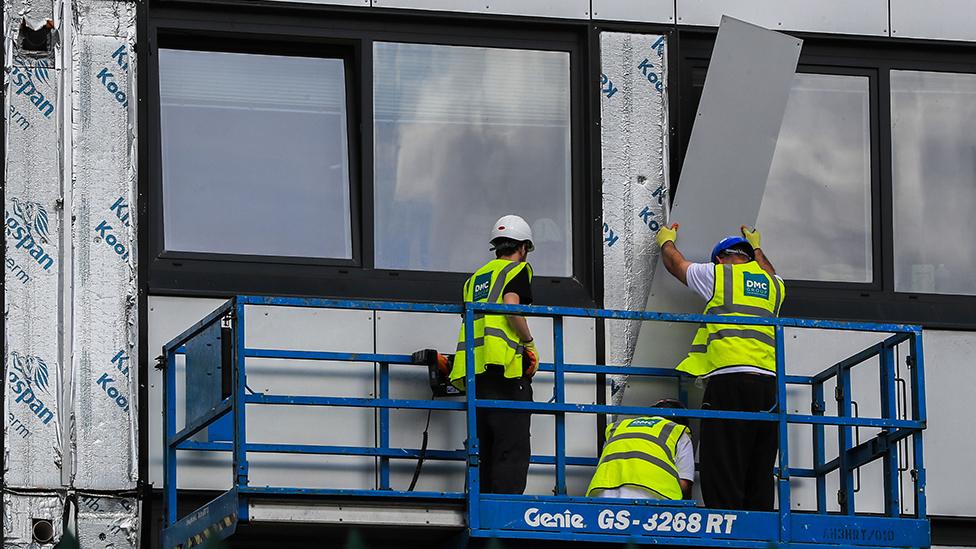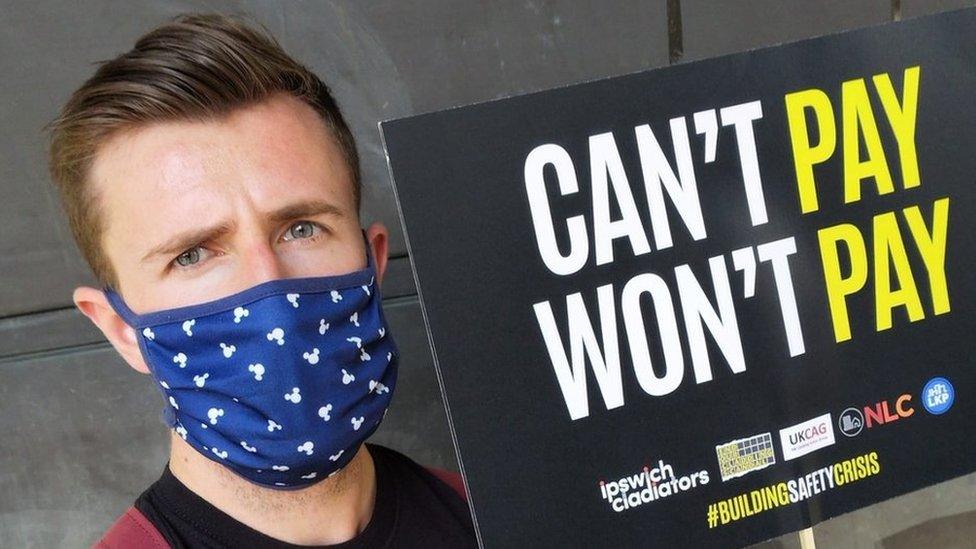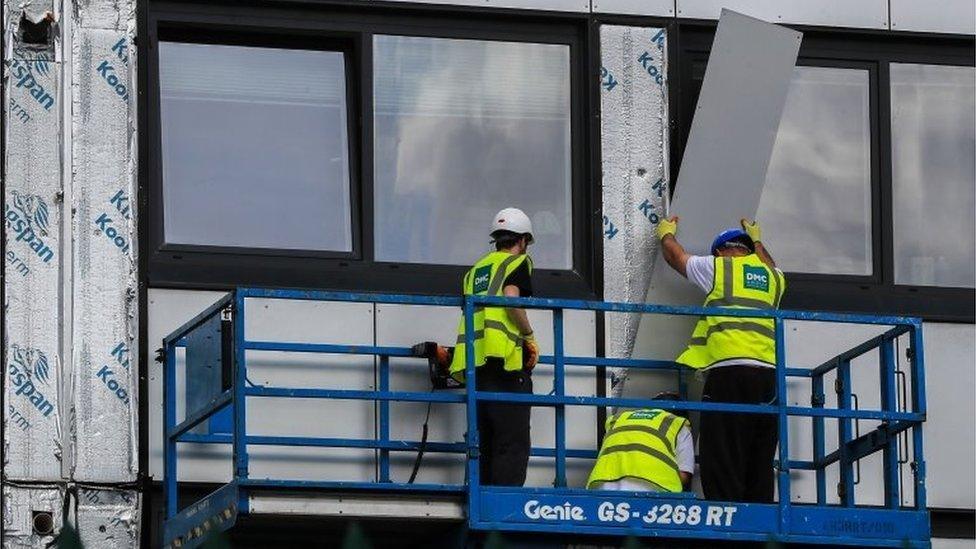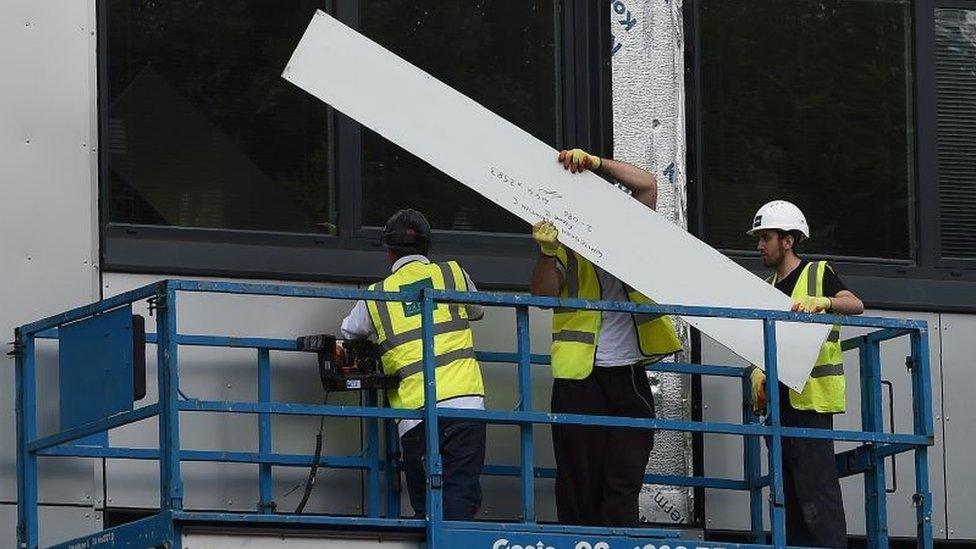Cladding crisis: Norwegian wealth fund urged to pressure firms and builders
- Published

Cladding being removed from a tower block in Manchester
Campaigners have urged Norway's giant state investment fund to pressure cladding firms and builders to fix fire safety issues.
Grenfell survivors and leaseholders affected by the cladding crisis called on Norges Bank to pull £5.7bn of funds from companies if they fail to do so.
Lucy Brown-Cortes of the End Our Cladding Scandal campaign said pressure from shareholders was "overdue".
Norges said it had raised product safety with several of the companies.
The cladding crisis has left many people with huge bills to fix unsafe homes.
After the Grenfell fire, which killed 72 people in 2017, flammable cladding and other fire safety defects were discovered in hundreds of blocks of flats across the UK.
Removing cladding can cost millions of pounds per block. The cost has often been passed on to flat owners under the leasehold system in England and Wales.
Many leaseholders have also seen sharply increasing service charges, and some have had to pay for so-called "waking watch" fire wardens.
A letter was sent to the boss of Norges Bank Investment Management (NBIM) demanding action on Friday, as first reported by the Sunday Times, external.
Its signatories include End Our Cladding Scandal, UK Cladding Action Group, Grenfell United, Action for Fire Safety Justice, the National Leasehold Campaign, Leasehold Knowledge Partnership and Tory MP Sir Peter Bottomley.
"This crisis has meant that at least 3,000,000 leaseholders are trapped in flammable flats they cannot sell, they are financing interim fire safety costs that they cannot afford to pay, and facing repossession/forfeiture over life-changing bills to make homes safe," the letter says.
Nicolai Tangen, the chief executive of NBIM, should "leverage its position as major shareholder", it says, to push 11 firms to fix safety issues and provide compensation to victims of the Grenfell fire.
NBIM should "divest its holdings in these firms if they fail to do so", the letter adds.
The fund is an investor in three companies that were involved in producing materials used on Grenfell Tower: Kingspan, Arconic and Saint-Gobain.
NBIM also has stakes in different housebuilders, as pointed out by the campaigners, such as Barratt, Bellway, Berkeley, Crest Nicholson, LendLease, Persimmon, Taylor Wimpey and Vistry.
Ms Brown-Cortes told the BBC that campaigners wanted to see NBIM "live up to their environmental, social and governance (ESG) credentials and leverage their position" as a major shareholder in some property developers.
The biggest sovereign wealth fund in the world promotes itself as a "responsible" investor in more than 9,000 companies globally. It has previously cut tobacco companies from its portfolio, for example.
In its response to the campaigners, NBIM said it had "raised product safety with several of the companies mentioned in your letter" and it was a topic it would continue to monitor.
NBIM added: "In accordance with the Fund's Ethical Guidelines, companies may be put under observation or be excluded if there is an unacceptable risk that the company contributes to or is responsible for serious or systemic violations of human rights.
"The independent Council on Ethics is responsible for assessing whether our investments are inconsistent with these guidelines. In line with our procedures, we have shared the information you have provided us with the Council of Ethics."
"We are coming for you" - Michael Gove's warning to firms that cut corners, sought to profiteer and mis-sold dangerous products
Housing Secretary Michael Gove backed the campaigners' "call to action" on Sunday.
"Developers and cladding companies who caused these problems must pay to fix them. We want these companies to do the right thing and help end this scandal," he said.
It was confirmed last week that firms would be given until March to agree how to help leaseholders trapped in "unsellable homes".
Mr Gove warned those who had mis-sold unsafe cladding or cut corners on homes that the government was "coming for you".
Residents in blocks 11-18m high had been ineligible for government support to remove unsafe cladding, but the Housing Secretary said earlier this week that the government was scrapping "the proposal for loans and long-term debt for medium rise leaseholders".
Mr Gove said some building companies had shown leadership and covered the costs but others "had not shouldered their responsibilities."
Related topics
- Published10 January 2022

- Published13 June 2022

- Published8 January 2022
